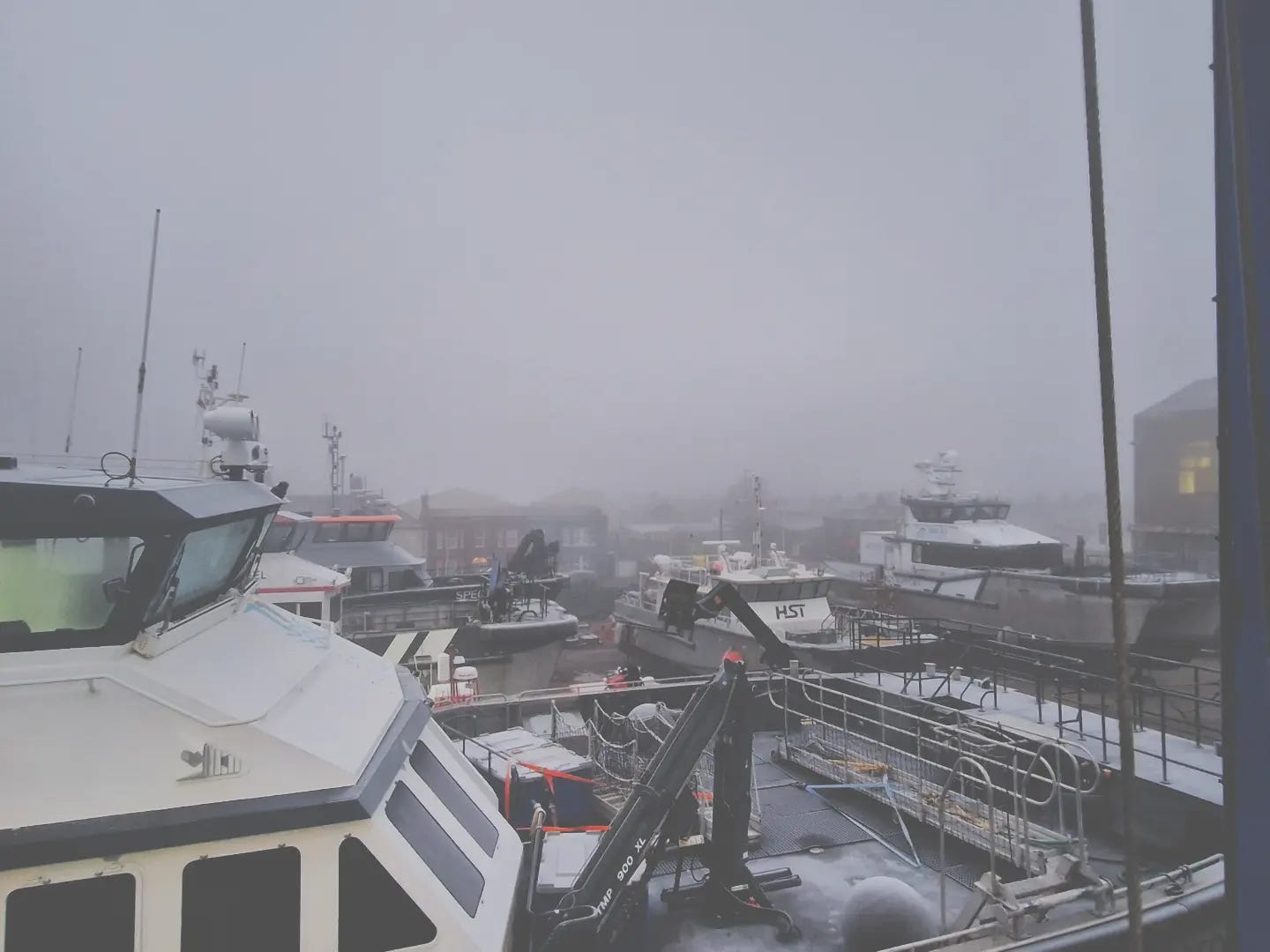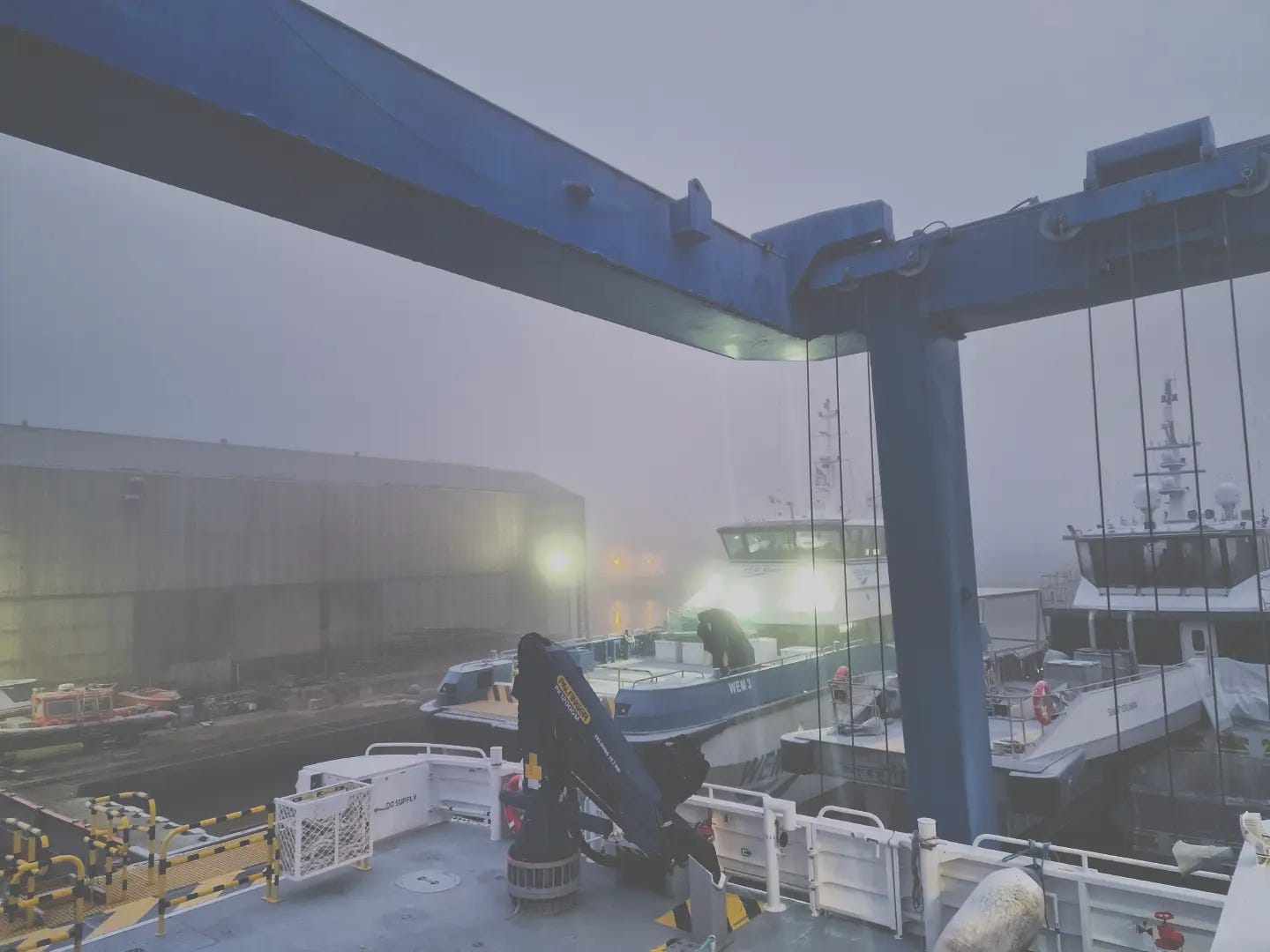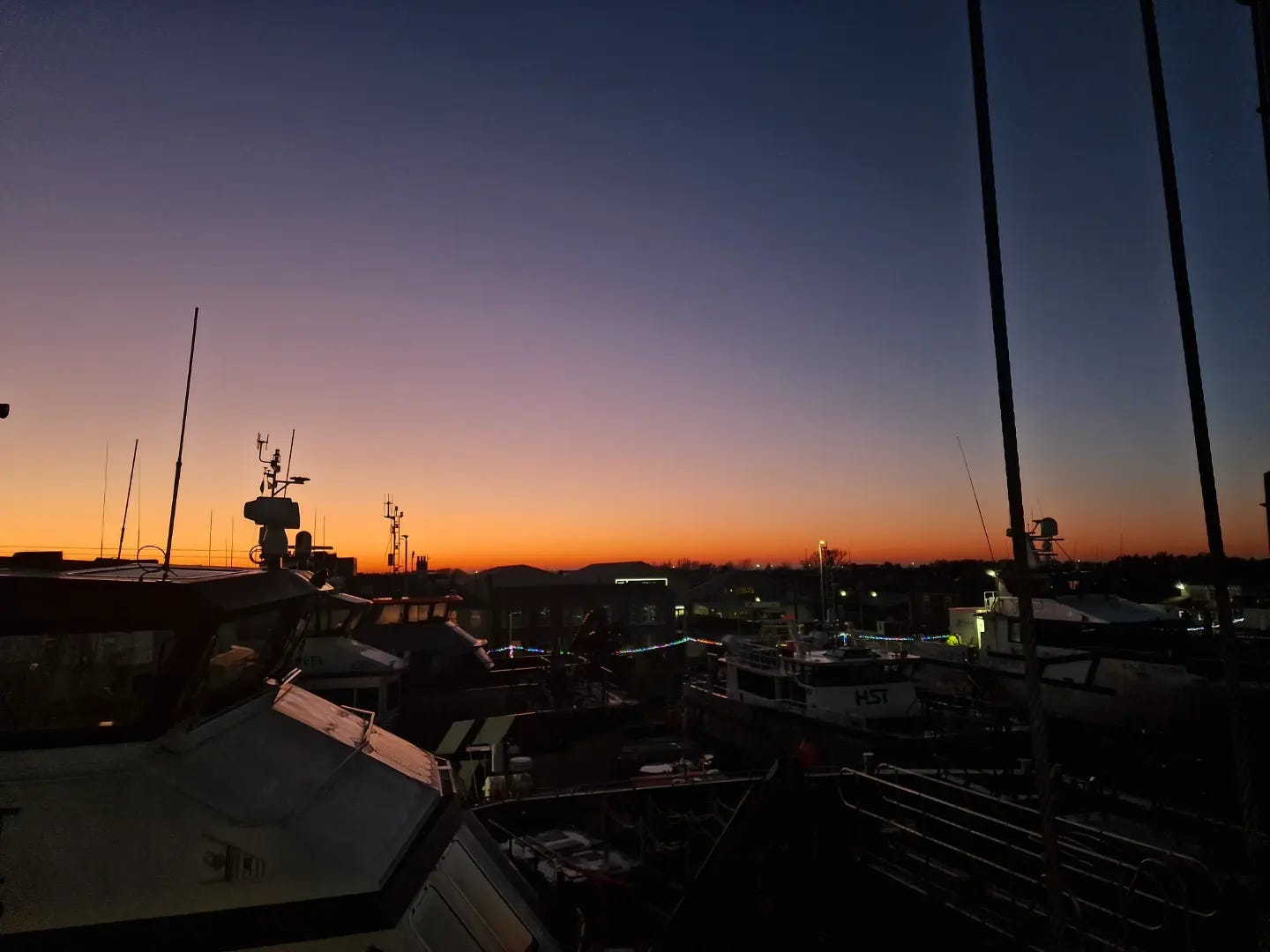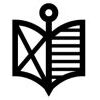I was told a few days before coming to this vessel that my main client had no work for me this month, as previously promised. The client doesn’t have enough business to keep their ‘on-the-books’ staff busy, let alone contractors. I’m self-employed, so this was to be expected at some point. Logical enough, as the winter weather makes it difficult for the small ships I now specialise in, to complete passenger or cargo transfers offshore. However, the information of a reneged promise came about five days before I thought I was going to be going away. Not thrilling news for the cash flow situation come January.
However, the life of a freelance Master Mariner is nothing if not dynamic. A couple of days later they had to ‘let someone go’. The captain on board this ship asked for me, by name, as a replacement.
‘Seven to fourteen days, max. It’s a busy charter with a strict client. They’re only working days, but it’s too much work for the Master, so you’ll be night Master, doing all the extra bits’.
By ‘extra bits’, they meant getting up before 4 am and preparing the ship, taking cargo, departing the locks at Grimsby Royal Dock, and undertaking a sea passage out of the Humber, one of Britain’s busiest shipping channels, to the wind farm. Then assisting the Master until noon, maybe catching a 1 hour nap in the afternoon, before doing the arrival at night, getting alongside for about 10 pm. Repeat, every day. Napping can be tricky when your bunk is all the way forward under the bow of the ship, and the boat’s job is to smash into wind farm towers and ships’ ladders offshore.
Fortunately, I’m friendly with the Master. A real salt, he’s been on top of one wave longer than I’ve been a skipper, so our working relationship has been fun, friendly, and co-operative. A Northern-Irish fellow who’s been at sea for 37 years man and boy, starting out as a fisherman and ending up as a CTV Master. A self-described ‘hillbilly’ from the Mourne mountains of County Down, with a good humour and an impatiently shaking leg, he’s seen it all. He once even survived a serious conflagration offshore that resulted in his trawler sinking. They abandoned ship to the life rafts but couldn’t get their life jackets in time because of where they were stowed, so he now moves the life jackets and immersion suits to the main deck on every vessel he boards.
He told me he couldn’t sleep on ships after it. For two years he would wake up and smell burning, no matter which ship he was on. His manner is restless to this day, and he barely sleeps at all offshore.
The ship is brand new. But not ‘brand new’, like a beautifully functional smartphone or iPad. More ‘brand new’ like a baby chick falling out of the nest, or a fawn, stumbling into traffic.
‘New-builds’, as they are called, are best avoided for two years. Wiser mariners than I steer clear of them until the one-year ‘bedding-in’ period elapses and the builder’s yard has been made to pay to rectify all of its defects. This is a normal feature of shipbuilding contracts because even if a standard design is used, most ships are essentially complex custom-built one-offs. Henry Ford never quite cracked our chestnut, and lack of standardisation remains one of the most common causes of incidents at sea. (More on ejector seats and standardisation another day).
We’ve had our share of faults. The first day was marked by multiple blackouts and steering failures. She steers like a pig at the best of times, requiring constant attention and hand steering. At her cruising speed of 20 knots, the autopilot cannot cope, and the vessel will randomly alter 35 degrees in either direction, without warning. This results in the unpredictable pointing of a very fast-moving ship directly at offshore wind turbines, rocky shoals or traffic. And traffic doesn’t like unpredictability. Therefore, my right forearm now resembles popeye’s, from all the manual steering I’ve been doing.
That said, I kind of love the High-Speed Craft vibe. Everything is way more exciting when you can max her out at 27 knots. And who cares if we burn 500 litres of diesel an hour doing it? We’re building a wind farm offshore, so therefore we’re the good guys. We can burn as much fuel as we want! Right, Greta?
Thanks for reading Captain Yankee Jock! Subscribe for free to receive new posts and support my work.
It’s sort of the equivalent of driving a formula one car, at the dodgems, in nautical terms. Most Merchant ships max out at 12 knots, have teams of officers to hold a watch, and take tugs and a pilot at every port. We do everything ourselves, with no pilot or tugs. We don’t even have a bow thruster, so manoeuvring is handled old-school, with ropes and fenders providing crucial assistance in tight corners.
Great fun, but highly challenging at the best of times. Clearly too much for some, as the ship has been aground once already since her launch this year.
‘She’s all wonky. The wonkiest boat I’ve ever seen’, says my Irish Master.
The grounding seems to have damaged a propeller, and possibly deflected a shaft. The resulting vibration through the gearbox is so bad that ceiling panels have vibrated all of their screws loose, and come falling down on us while navigating.
The electrical distribution also seems to be imbalanced. That’s probably what was causing us to blackout.
Suddenly losing your navigation systems, radar and steering while doing 20+ knots in a crowded wind farm in mist and darkness is quite an interesting sensation. Equal parts hyper-focus, adrenaline, and action, countered with simultaneous resignation. The heart beats faster as your hands and eyes fumble and scan for something useful to do. Your mind goes silent to drown out the din of multiple alarm bells ringing, before latching on to anything productive that can be done to improve the situation.
In a second, one is transported from a high-tech spaceship-like environment, where fans hum and screens glow, to one of cold, primitive chaos. Every aid to navigation has become a traitor. There is no signal, only noise. Obstacles surround you.
What can I teach you about these moments in seafaring, that might be useful to you in your life?
One important thing to remember is to ‘Zoom in’. Something that we are not trained to do in our anxious society of extrapolation and manipulation.
One large ship enters or leaves the Singapore Strait every six minutes. When your radar screen has over 100 contacts on it, your mind simply cannot process that level of information in any meaningful way. Your fight or flight response is paralysed with information overload, and consequence analysis becomes impossible. Stress, cortisol, the carcinogenic hormone of immune suppression, is the resulting physiological response. (Please, please read Steven Wilkinson’s Guest Post by Robin from WhatNowDoc, on Substack. For anyone who knows a cancer sufferer (which is everyone), it’s an engaging and hopeful read).
So how to avoid panic, cortisol, and premature cancer? Zoom in.
When you zoom in on your radar, of course, your problems are still out there, somewhere in the darkness waiting for you. So, in some sense, zooming in doesn’t really ‘solve’ anything.
But in another, more important sense, you are doing what you can. Which is, to deal with only what is immediately in front of you. And more often than not, by the time you reach those other ‘problems’ farther along your route, they’ve also seen you coming. More distant threats tend to correct themselves or become the focus of your attention just at the right time for you to do something about them. You’ll deal with it, when you get to it. (By the way, farther is correct when speaking of distance, just in case the ‘further’ police are reading this).
The mistake being made with so-called ‘environmental policy’ is precisely this error. Single factor analysis, zoomed out, based on flimsy extrapolation, and sacrificing everything that is good and right, with the stated aim of fixing a problem that we have no proof is actually a problem, or that we are able to do anything about. Even if it means Scottish grannies freezing to death this winter after we all endured lockdowns and tyranny to supposedly save granny.
But what about when you have no radar? Or steering? Or electronic navigation? And you can hardly think because so many alarms are sounding? And you can’t call the engineer on the radio because he dropped it in the sea that morning?
‘Ask, and it shall be given you; seek, and ye shall find’ – Matthew 7.
Jordan Peterson recently pointed out to Benjamin Netanyahu in his interview for DailyWire+, that ‘the spirit of navigation is the spirit of God that guided the Israelites through the desert’.
One of our jobs as human beings, who embody the image of God, is to access that spirit of navigation in our lives. To access it you need to have faith that you are made of the same stuff as your mighty forebears, who were survivors, all. You need to have faith that when you scan the blur of obstacles and opportunities around you, that something will call to you.
The first thing that will call to you will be the smallest thing within your reach, that you can do that will be useful.
1: Silence that loud engine alarm. Now you can think a little.
2: Reduce speed to dead slow ahead. Now you have even more time to think, before you collide with an obstacle.
3: Get out of the chair and call for help (again, because all four of the portable radios fell in the sea).
4: Find out what still has power, and what you can do to reset things.
And on it goes, until after two hours, you now have a functional ship again, and you can steer out of danger and limp back into port, to do it all again another day.
One annoying accident of misnomer, in the toxic positivity culture of the US self-help industry, is the conflation of a ‘Can Do’ attitude with a sort of Napoleonic-Nietzschean force of willpower over reality. I think of a can-do-attitude in a more attainable, practical sense. Like, ‘the day isn’t over yet. What else can I do?
Simple enough advice?
One more useful piece of information I learned from the Huberman Lab podcaster, Dr Andrew Huberman, was that doing this in a step-by-step manner actually forces your biology in the right direction.
For every small task that you complete, you actually force your body to manufacture little bits of dopamine. And the more of those little building blocks of progressive happiness that you force into existence, the more they will combine, and coalesce, and snowball into driving you forward. And the more your dopamine system is activated by completing little micro-tasks, the better your attention will be directed toward solving the problems in front of you, in your pursuit of finding a pathway through the panic. You will be dopaminergically addicted to finding your way. Navigating the world will become your religious mode of being.
So, what does that mean?
It means don’t stand there and panic. Zoom in and do things. Action pays compound interest, and biological dividends.
Doing the things that you can do, will lead you to being able to see more things that you can do. And that is how you navigate potential anxiety and avoid panic.
So, when you are depressed, or hungover, or ill, or overwhelmed, just do what you can. One thing at a time. Get out of bed. Tell yourself ‘that was enough sleep’ (even if the ship has been tripping out and alarming all night at strange hours). Wash a cup. Get dressed. Vacuum the floor.
Everything matters. Everything you do makes you, and your life in this world, better.
Les Miserables of our time are the ones who stay zoomed out. The Greta Thunberg lovers and Gaia worshippers who go on strike until ‘all of climate change is solved’, or the people who won’t get a job and pay their way because ‘corporations are too corporationy and capitalism is corrupt’. These people are stressed and depressed because they’ve paralysed themselves with too much abstract thought. They want to change the world, and they’re too paralysed and zoomed out to change a light bulb, or their bed sheets. Better just to throw some soup on a priceless painting.
That’s on the left, where the collective is conflated with the self, and unearned virtue borrowed via the logic that consensus equals truth. But the right has its own pathologies, and the anti-vax and freedom movement is in danger of sabotaging itself with a similar problem of excessive ‘zoom-out’.
True, all government is corrupt, and our politicians are hell bent on destroying the sovereign nations that elected them. Crony-crapitalism owns the politicians anyway, and it isn’t a fair fight. Price controls, fiat money, regulatory capture, market collapse, etc. You can’t win. Tune out, disengage, segregate, and separate yourself from the woke, the mob, and the zombie apocalypse, because it’s all coming down anyway.
The right is right. The giants of Big-Tech, Big-Pharma, Big-Government are the giants of old that threaten to bring the flood and destroy us all. But so what?
Even if you’re right about everything, we need to deal with things that are within reach. Just because people have acted badly, with malice of forethought, and evil in their hearts, does not mean we are helpless. And we should take care never to present our situation as overwhelming or hopeless, just for the ego trip of saying ‘See, I was right’.
You can see the fatalism and helplessness in the flailing around looking for solutions, while at the same time rejecting dialogue and certainty. Yes, build your ark. But speak to people about theirs too, and do not isolate yourself. The flood is coming, but your relationships are the only ark you really have.
Zoom in and do what you can.
Our culture has focused so much on the self or individual as the only source of meaning, that it is easy to grow up thinking that our lives mean nothing unless we dedicate them to solving one great problem, or one sacred cause. That is idolatry of the ego, and it is something we can all be guilty of. Particularly in leadership or management positions.
At some point in our lives, we all want to be the one in command. We lust for leadership, and prune and preen ourselves to be noticed and selected for greatness.
But the leader is the one who knows the way and goes that way. The leader is the one who finds the right words to move forward. And I’ve just told you, the way to move forward when things are difficult, is to do the little things right. And if you do them well enough, and often enough to become a teacher, and a servant, then you might just well get some followers one day.
A leader embodies mediation, communication, attention and identification. The way, is something ‘felt-out’, by touch and sensory instinct. Not something gifted by ‘experts’ or academics. Noah went to sea in new-build, and so might you.
Moses was the archetypal leader. A fallen murderer, who found his calling from God in the sharp thorns and burning flames of a bush in the desert. He led slaves to the freedom to follow their conscience, and to the land of milk and honey.

Jonathan Pageau describes the leadership of Moses as the mediation between this milk and honey. Milk representing the best and purest of what is close, like the symbol of the motherly love that feeds the newborn babe. Honey, represents the best of what is wild and dangerous, the sweet reward for braving the predatory stings at the outer edge of camp. The fruits of the provider. Matriarch and Patriarch in communion.

Leadership as service, or mediation, involves bringing what is good out on the edge, back into the centre. Bringing what is highest, down to the lowest. Bringing the best from within, to those out on the edge. In that way, we serve whoever we can. We focus attention outside of our egos and avoid the trap of pathological focus on the self.
Most managers are caught in the middle, between owners and decision makers at the top or the centre, and workers and sub-contractors at the outer edge or the bottom. Their job is to divine the desires and interpretations of the owners, and communicate that effectively down the hierarchy to the team, and interpret how nebulous ambitions and desires translate into physical, practical reality. Conversely, they are also filters and barriers, whose job it is to silence the ringing alarm bells and allow the leaders higher up the time to think and navigate the bigger picture. But one crucial aspect, the most dangerous and difficult in management, is judging the right amount of alarm to pass up the chain. As a manager, or leader, you must treat every human being in our organisation with respect and humanity. Not out of religious principle, but purely self interest. You see, every employee, customer, client and contractor you have, is a powerful data-gathering sensor. And every one is worth listening to, at least at times.
There is no more dangerous thing in a business organisation than someone occupying an intermediary management position, who looks down on other people, or has contempt for them or their opinions. Such people will feather their nest, employ their friends, have a great time, and keep the top brass smiling and happy, even as everything that supports them crumbles and falls apart.
I see this in action all the time in the shipping industry. Sailors are, after all, literally people out on the edge of society. Misfits, who can’t fit in anywhere else. Most middle managers remember some minor incidents of unpleasantness in their early career and think that as soon as they are safely ashore and, in the office, they can look down on their former shipmates with contempt. They are after all, ‘the biggest bunch of moaners and complainers you ever saw. I endured worse when I was at sea. Suck it up, buttercup’.
But most likely you can all see it as well. I’m sure my industry has no monopoly on poor management. Please, share examples in the comments. I’d love to hear your stories.
You will often see it in your earlier jobs, before you had a decent career, in the negative examples of poor management, bad leadership and the neglect attendant in most low ranking jobs. The reason for that is that people who show good attentive leadership skills don’t stay at the bottom for long, so you’ll need to elevate yourself in order to encounter more of the good kind of leaders and mentors that you should look to. The only unique thing about shipping, is that you can be the most attentive, intelligent, compsed, disciplined and thoughtful leader in the world, and still get stuck with an illiterate crew of reprobates, criminals and thugs, on a death trap of a ship, navigating hellish conditions, for a neglectful, ungrateful owner who is destined to be out of business soon, but not quite yet.
One major mentor for me was an Italian Staff Captain on a luxury cruise ship, who told me to ‘observe every officer I worked with from each nationality, copy their good traits, and avoid their bad ones’. He wrote some down for me in my notebook, stuffed it in my top shirt pocket and patted it for emphasis on ready accessibility.
That is the real way for ‘diversity’ to be a strength, by the way. After observation, filtration, and discernment.
One of the most practical traits I’ve noticed in day to day leadership is to have good manners. Dale Carnegie’s book, How to Win Friends and Influence People is a masterclass in the deployment of good manners, in a practical setting. I highly recommend it, for use in challenging circumstances.

For instance, our ship was falling apart by the time we completed the charter out of the Humber. We sailed immediately to the shipyard for repairs. We’ve been lifted out of the water for and the ship is now resting on blocks in a busy, and grubby yard. It has snowed, and most nights are reaching minus -3 to -4 degrees C. Day time is about zero degrees at the moment.

The days are spent enduring rolling blackouts, flickering lights, and an absence of appliances, as electricians knock everything off and break things over and over again to try to identify wiring problems and solutions.
With doors open, and electric heaters unavailable, you can see your breath indoors. The galley is out of action, and I ate a cold pot noodle one day, because the kettles were unavailable, leaving only Lukewarm water leftover from a previous boil. We went out for dinner a couple of times on the company, because there were no lights available, and cooking was impossible. Fresh water was a nightmare to load, and moving about the yard is dirty, muddy, and fraught with hazards. The toilets operate from an electric flush, so are unavailable for much of the day, and you need a flashlight at times to even see one. The hot water went off last night, and the boys had to have cold showers after working outdoors for much of the day in rain and sub-zero temperatures. No en-suites here, so after a cold shower in a communal toilet near the galley, it’s a cold twenty-metre walk back to your cabin, through compartments that are literally – not figuratively – as cold as a refrigerator.
Some of the cabins are so cold, and poorly ventilated that the mattresses are soaking wet with condensation. Being built in Singapore, the builders evidently don’t understand the requirements for insultation in the North Sea. One deckhand in that cabin showed signs of dizziness and has admitted to feeling faint now. I am charging a new gas detector and will be checking his cabin for Carbon Monoxide build up later today.
It was safe to say that the boys have been pretty upset. Morale is low, and there has been some colourful language of late. It is a minor miracle that the various threats to perform amateur dentistry using a stiff right hook have not been acted upon. And even I’m getting pretty sick of the ‘C’ word.
So what leadership and safety culture example was set by the company, when they sent their shoreside managers down from the office to ‘assist’ the crew with repairs? A pretty careless one, if you ask me. Every complaint was met with ‘it’ll be fine tomorrow, or it could be worse, you should be grateful to have a job, etc’. Work was constantly interrupted by CYA email ping-pong and adversarial blame-avoidance exchanges. Company visitors who’d been shutting off vital services all day on the ship, willy-nilly and without discussion or warning, evacuated the vessel promptly at 5 pm to enjoy the warmth and luxury of hotels that cost three-times what crew are allowed on travel days. And to really add insult to injury, eating the crews’ food without asking permission.
We are contractors, so we purchase our own provisions, and bill the company, adhering to a strict budget. So the eating of someone else’s food, and telling them you don’t care when they complain, is truly outrageous. People’s leftover takeaways from the night before even disappeared.
I know the result of all this. People’s CVs have been flying out from this company, and come spring, the best will be underway somewhere else.
In the meantime, what can I do?
1. I listen to every complaint, without comment, and acknowledge it.
2. I use people’s first names, frequently.
3. I do other people’s dishes for them and clean up more than just my own mess.
4. I clean the toilets and showers. Even if they are cold and dark, at least they’ll be clean.
5. I listen to people’s stories about home, and family. And the various crimes they’ve committed.
6. Keep the flow of caffeine and sugar coming. Don’t steal their food, nor engage in with-hunts. And I eat alongside the crew, including the ones I don’t like.
7. Shut the doors when people coming in and out forget that we actually live on board this building site.
8. Stay clean, do my laundry, and keep on top of the paperwork.
9. Ignore stupid email fights with the office.
10. Keep people calm while they wait for the hot water to come back on.
11. Remind them that all things are temporary.
12. Take their complaints seriously enough, to get the gas detector out, or send them to a doctor, even when there is not much I can do about them.
Thank you for reading Captain Yankee Jock. This post is public so feel free to share it.
Anyway, I’m going home on Tuesday, for a nice long Christmas break at home, until the 01st of January. I fired out about 25 CVs to various companies when I thought I was going to have a gap in my schedule this month, and about 10 companies got back to me with positive noises for the new year. So I won’t be stuck with this client for the long term.
I even got more or less offered an offshore project manager role without even an interview. But when they said it was a PAYE permanent employment situation, I did the tax calculation and realised, to make it worth my while, I’d have to ask for about £90K salary. Tax is SO MUCH now in the UK, that employing someone is almost double the cost of hiring a contractor. Ridiculous.
I’m also in the running for a London maritime job at an NGO, but I really don’t know what they’d have to pay me to do a couple of weeks a month in London.
I haven’t quite progressed my own business plans to where I want them to be yet, so the money and prestige of a job like that is quite appealing. But to be honest, I’ve enjoyed so much freedom this year as a contractor, it’s starting to dawn on me that I may now be unemployable.
Thanks for reading Captain Yankee Jock! Subscribe for free to receive new posts and support my work.

